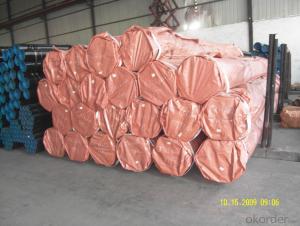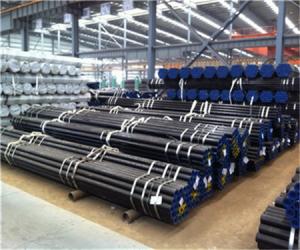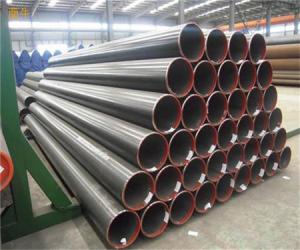Seamless Carbon Steel Pipe 24"
- Loading Port:
- China Main Port
- Payment Terms:
- TT or LC
- Min Order Qty:
- -
- Supply Capability:
- -
OKorder Service Pledge
OKorder Financial Service
You Might Also Like
1、Structure of Seamless Pipe:
Seamless pipe is formed by drawing a solid billet over a piercing rod to create the hollow shell. As the manufacturing process does not include any welding, seamless pipes are regarded as withstanding pressure better than other types, and was often more easily available than welded pipe.
2、Main Features of the Seamless Pipe :
• High manufacturing accuracy
• Small inertia resistance
• Strong heat dissipation ability
• Good visual effect
• Reasonable price
3、Seamless Pipe Specification:
Standard | GB, DIN, ASTM ASTM A106-2006, ASTM A53-2007 |
Grade | 10#-45#, 16Mn 10#, 20#, 45#, 16Mn |
Thickness | 8 - 33 mm |
Section Shape | Round |
Outer Diameter | 133 - 219 mm |
Place of Origin | Shandong, China (Mainland) |
Secondary Or Not | Non-secondary |
Application | Hydraulic Pipe |
Technique | Cold Drawn |
Certification | API |
Surface Treatment | factory state or painted black |
Special Pipe | API Pipe |
Alloy Or Not | Non-alloy |
Length | 5-12M |
Outer Diameter | 21.3-610mm |
Grade | 20#, 45#, Q345, API J55, API K55, API L80, API N80, API P110, A53B |
Standard | ASME, ASTM |
4、Packaging & Delivery
Packaging Details: | seaworthy package,bundles wrapped with strong steel strip |
Delivery Detail: | 15-30days after received 30%TT |
5、FAQ of Seamless Pipe :
①How is the quality of your products?
Our products are manufactured strictly according to national and internaional standard, and we take a test on every pipe before delivered out. If products’ quality don’t accord to discription as we give or the promise before you place order, we promise 100% refund.
②How about price?
We can give you lowest price , and we have a policy that “ for saving time and absolutely honest business attitude, we quote as lowest as possible for any customer, and discount can be given according to quantity”.Please trust the quotation we would give you, it is professional one.
③Why should you chose us?
We can give you both good quality and price.Besides, we can also provide professional products inquiry, products knowledge train(for agents), smooth goods delivery, exellent customer solution proposals.Our service formula: good quality+good price+good service=customer’s trust
6、Seamless Pipe Images:
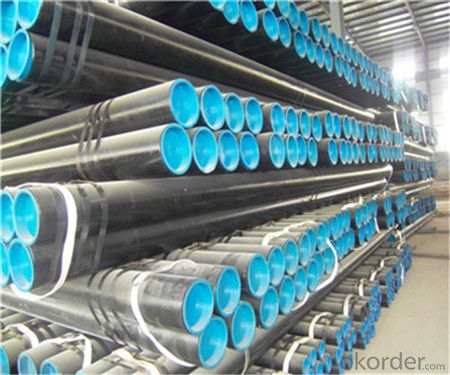
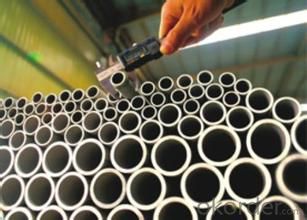
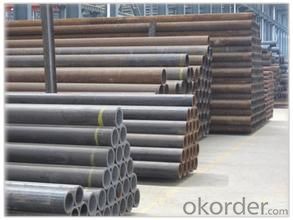
- Q:How are steel pipes tested for quality control?
- Steel pipes are tested for quality control through various methods such as visual inspection, dimensional checks, and non-destructive testing techniques including ultrasonic testing, magnetic particle inspection, and hydrostatic pressure testing. These tests ensure that the pipes meet the required specifications, standards, and structural integrity, ensuring their quality and reliability.
- Q:Can steel pipes be used for underground water supply systems?
- Indeed, underground water supply systems can utilize steel pipes. These pipes, being robust and resistant to corrosion, are well-suited for subterranean purposes. They possess the ability to endure high water pressure, facilitate effective water flow, and exhibit a lengthy lifespan. Nevertheless, it is imperative to guarantee the steel pipes are adequately coated and safeguarded against corrosion to avert any water supply contamination. Furthermore, due to their heavier nature in comparison to alternative materials, additional support may be necessary during installation. To identify any potential concerns and avoid leaks or harm to the underground water supply system, proper maintenance and regular inspections are of utmost importance.
- Q:How are steel pipes made?
- Steel pipes are made through a process called pipe manufacturing, which involves multiple steps. Firstly, raw steel is melted in a furnace and then subjected to continuous casting to form a solid billet. This billet is then heated and pierced to create a hollow tube called a shell. Next, the shell is rolled and stretched to the desired diameter and thickness using a series of rollers. The pipe is then subjected to a process called welding, where two edges of the shell are fused together to create a seamless or welded pipe. Finally, the pipe undergoes various finishing processes such as cutting, straightening, and inspection before being ready for use.
- Q:What is the thickness of steel pipes?
- The thickness of steel pipes varies depending on the specific application and type of pipe used. Typically, steel pipes are available in various thicknesses, measured by their schedule or wall thickness. Schedule 40 is the most common schedule for steel pipes, known for its standard wall thickness. However, for applications demanding higher strength or pressure resistance, thicker pipes with higher schedules like Schedule 80 or Schedule 160 are also available. Moreover, the thickness of steel pipes can be tailored to meet specific project requirements.
- Q:Can steel pipes be used for drinking water supply?
- Drinking water supply can indeed utilize steel pipes. For water distribution systems, steel pipes are widely employed owing to their robustness, longevity, and capacity to endure high pressures. Nevertheless, it is crucial to highlight that the steel employed in these pipes must be purposefully engineered and endorsed for potable water applications. This ensures the water remains uncontaminated by any detrimental substances. Furthermore, regular inspections and appropriate upkeep are imperative to avert the development of rust or corrosion, which may impact water quality.
- Q:How do steel pipes differ from other types of pipes?
- Steel pipes differ from other types of pipes in several ways. Firstly, steel pipes are incredibly durable and strong, making them suitable for carrying high-pressure fluids and gases. They have a high resistance to corrosion and can withstand extreme temperatures, making them ideal for various industrial applications. Additionally, steel pipes have a smooth interior surface, which reduces friction and allows for efficient flow of liquids or gases. They are also highly versatile, as they can be easily welded, threaded, or bent to fit specific project requirements. Overall, steel pipes are known for their strength, durability, and versatility, making them a preferred choice in many industries.
- Q:What is a steel pipe?
- A steel pipe is a cylindrical hollow tube made of steel, known for its strength and durability. It is commonly used in various industries for transporting fluids, gases, and solids, as well as for structural purposes in construction and infrastructure projects.
- Q:What is an electric welded pipe (EFW)? Seek help!
- It is through one or several consumable between the electrode and the workpiece on the metal heating the metal between a process with the arc to metal and filler material fully melted, no pressure, filler metal parts work from all electrodes
- Q:What are the advantages of using stainless steel pipes?
- There are several advantages of using stainless steel pipes. Firstly, stainless steel pipes have excellent corrosion resistance, making them suitable for a wide range of applications, including industrial, commercial, and residential plumbing systems. They can withstand harsh environments, chemicals, and high temperatures without deteriorating or rusting. Secondly, stainless steel pipes have high strength and durability, ensuring long-term reliability and reducing the need for frequent repairs or replacements. They can handle high pressure and stress, making them suitable for transporting fluids and gases in various industries. Additionally, stainless steel pipes are hygienic and easy to clean, making them ideal for applications in the food, beverage, and pharmaceutical industries. They are resistant to bacterial growth and contamination, ensuring the integrity and safety of the transported materials. Furthermore, stainless steel pipes are aesthetically pleasing and can be easily customized to fit different design requirements. They offer a sleek and modern appearance, making them suitable for architectural and decorative purposes. Overall, the advantages of using stainless steel pipes include corrosion resistance, durability, strength, hygiene, and aesthetic appeal, making them a reliable and versatile choice for various industries and applications.
- Q:Can steel pipes be used for underground electrical conduits?
- Yes, steel pipes can be used for underground electrical conduits. Steel pipes are durable, strong, and resistant to external forces, making them suitable for protecting electrical wiring in underground installations. Additionally, steel pipes offer excellent corrosion resistance, ensuring the longevity and safety of the electrical system.
1. Manufacturer Overview |
|
|---|---|
| Location | |
| Year Established | |
| Annual Output Value | |
| Main Markets | |
| Company Certifications | |
2. Manufacturer Certificates |
|
|---|---|
| a) Certification Name | |
| Range | |
| Reference | |
| Validity Period | |
3. Manufacturer Capability |
|
|---|---|
| a)Trade Capacity | |
| Nearest Port | |
| Export Percentage | |
| No.of Employees in Trade Department | |
| Language Spoken: | |
| b)Factory Information | |
| Factory Size: | |
| No. of Production Lines | |
| Contract Manufacturing | |
| Product Price Range | |
Send your message to us
Seamless Carbon Steel Pipe 24"
- Loading Port:
- China Main Port
- Payment Terms:
- TT or LC
- Min Order Qty:
- -
- Supply Capability:
- -
OKorder Service Pledge
OKorder Financial Service
Similar products
New products
Hot products
Hot Searches
Related keywords
